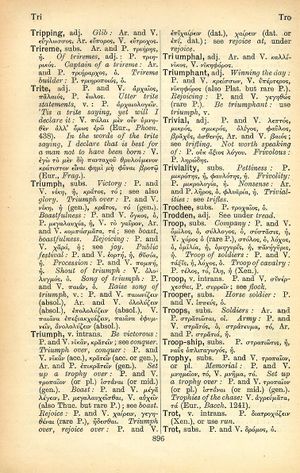trite: Difference between revisions
From LSJ
Θεὸς πέφυκεν, ὅστις οὐδὲν δρᾷ κακόν → Deus est, qui nihil admisit umquam in se mali → Es ist ein göttlich Wesen, wer nichts Schlechtes tut
(Woodhouse 5) |
(CSV5) |
||
| Line 1: | Line 1: | ||
{{ | {{Woodhouse1 | ||
| | |Text=[[File:woodhouse_896.jpg|thumb|link={{filepath:woodhouse_896.jpg}}]]'''adj.''' | ||
P. and V. [[ἀρχαῖος]], [[παλαιός]], P. [[ἕωλος]]. | |||
<b class="b2">Utter trite statements</b>, v.: P. ἀρχαιολογεῖν. | |||
<b class="b2">'Tis a trite saying, yet will I declare it</b>: V. [[πάλαι]] μὲν οὖν ὑμνηθὲν ἀλλʼ [[ὅμως]] ἐρῶ (Eur., ''Phoen.'' 438). | |||
<b class="b2">In the words of the trite saying, I declare that is best for a man not to have been born</b>: V. ἐγὼ τὸ μὲν δὴ [[πανταχοῦ]] θρυλούμενον κράτιστον εἶναι φημὶ μὴ φῦναι βροτῷ (Eur., <b class="b2">Frag.</b>). | |||
}} | }} | ||
Revision as of 10:07, 21 July 2017
English > Greek (Woodhouse)
adj.
P. and V. ἀρχαῖος, παλαιός, P. ἕωλος.
Utter trite statements, v.: P. ἀρχαιολογεῖν.
'Tis a trite saying, yet will I declare it: V. πάλαι μὲν οὖν ὑμνηθὲν ἀλλʼ ὅμως ἐρῶ (Eur., Phoen. 438).
In the words of the trite saying, I declare that is best for a man not to have been born: V. ἐγὼ τὸ μὲν δὴ πανταχοῦ θρυλούμενον κράτιστον εἶναι φημὶ μὴ φῦναι βροτῷ (Eur., Frag.).

